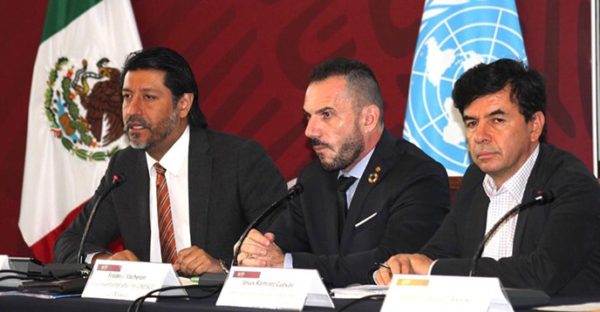Mexico to host UNESCO’s regional celebration of the International Day to End Impunity for Crimes against Journalists 2019

On 7 November, UNESCO, in collaboration with Mexican authorities, is organizing an international seminar in Mexico City to discuss the issue of impunity. The seminar will analyze the mechanisms of prevention, protection and prosecution to bring justice to murdered journalists and review the challenges and achievements of the fight against impunity in Mexico.
On 7 November 2019, Mexico will host the regional celebration of the United Nations Educational, Scientific and Cultural Organization (UNESCO) International Day to End Impunity for Crimes against Journalists (IDEI), which aims to draw attention to attacks that limit the ability of reporters to carry out their work and compromises the public’s right to information.
Frédéric Vacheron, ad int. Representative of the UNESCO Office in Mexico, announced the upcoming event at a press conference also chaired by Cristopher Ballinas Valdéz, Director General for Human Rights and Democracy at Mexico’s Ministry of Foreign Affairs, and Jesús Ramírez Cuevas, General Coordinator of Social Communication and Spokesperson for the government of Mexico.
Since 2014, 2 November provides an opportunity for UNESCO, the UN and civil society to commemorate IDEI through various activities around the world. This year, due to Mexico’s strategic role in the international community and especially in Latin America, as well as the country’s commitment to the fight against impunity for crimes against journalists, UNESCO proposed to hold its regional celebration in Mexico City.
In collaboration with the Mexican authorities, UNESCO is organizing the International Seminar “Strengthening Regional Cooperation to End Impunity for Crimes and Attacks against Journalists in Latin America“. The one-day seminar will discuss the problem of impunity, analyze prevention, protection and prosecution mechanisms to provide justice to killed journalists and review the challenges and achievements of the fight against impunity in Mexico. The event will also share proposals on the way forward, including raising awareness and strengthening the capacities of key actors.
“This celebration will bring together representatives of Member States, the Organization of American States, judicial systems, protection mechanisms, the media and civil society from Latin America and other parts of the world, particularly from countries facing murders of journalists due to organized crime,” Vacheron stated.
The seminar will be chaired by Moez Chakchouk, Assistant Director-General of UNESCO’s Communication and Information Sector; Edison Lanza, Special Rapporteur on Freedom of Expression of the Inter-American Commission on Human Rights; Representatives from Mexico’s mechanism for the protection of journalists; the Prosecutor’s Office for Crimes against Freedom of Expression and journalists and expert media organizations.
Meanwhile, the representative from the Ministry of Foreign Affairs stated that the government of Mexico has a permanent relationship with all United Nations agencies and works with them to strengthen regional cooperation in several areas, one of them being attacks on journalists and media, which is of utmost importance to the Mexican government.
Ballinas mentioned the importance of establishing a Human Rights scheme that guarantees all people a dignified life; part of this, he said, is the freedom of the press.
Ramírez Cuevas, the spokesperson for the government of Mexico, highlighted that the federal government is committed to freedom of expression, the construction of a judicial system and a media ecosystem, all of which guarantee the safety of Mexican journalists.
He also pointed out that the current administration supports the will of democracy and favors human rights. He assured that these are a fundamental commitment and that Mexico’s “Fourth Transformation” would not be understood without the consolidation of democracy by assuring the right to information for Mexican citizens and by respecting freedom of expression and the work of journalists.
Ramírez Cuevas also stated that the IDEI celebration in Mexico would draw a baseline to support more plural and free institutions, and to recognize and defend the work of Mexican journalists.
The international event builds on several previous IDEI commemorations around the world. In 2014, UNESCO co-organized an interregional dialogue at the European Court of Human Rights in Strasbourg (France). In 2015, 2016, 2017 and 2018, UNESCO organized several regional IDEI celebrations in collaboration with national authorities, human rights bodies, the judiciary, journalists and the media in Costa Rica, Tanzania, Sri Lanka and Lebanon respectively – countries with a high number of killed journalists in the last two years.
Every two years on this date, the Director-General of UNESCO also submits her report on killings of journalists and the issue of impunity. The most recent report (2018) presents an analysis of cases condemned by the Director-General in 2016 and 2017. Based on the information provided by Member States, the report also takes stock of the judicial investigations undertaken into each of the murders recorded by UNESCO from 2006 to 2017.
For UNESCO, IDEI’s regional celebration in Mexico represents a unique opportunity to strengthen the work of its Communication and Information Sector, at a key (albeit complex and challenging) moment for Mexican society, for its democratic systems and, above all, for its journalists.

